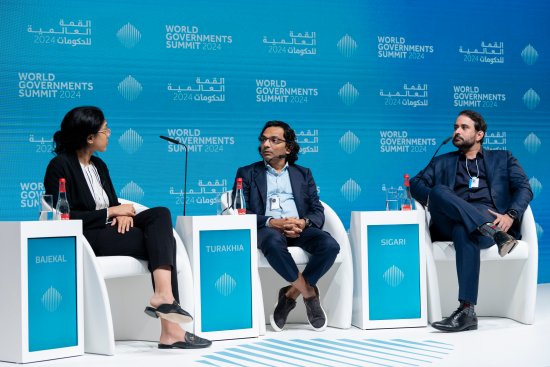
Entrepreneurs and venture capitalists shared predictions for the year ahead in artificial intelligence at the World Governments Summit in Dubai.
Each year, the TIME100 Most Influential Companies list recognizes businesses making extraordinary impact around the world. Enter your company here today.
As investors were wowed by ChatGPT and the rapid progress made by artificial intelligence in recent years, money poured into the industry. Generative AI and AI-related startups raised nearly $50 billion in 2023, according to Crunchbase, a business data provider.
Already in 2024, share prices for firms that play a role in manufacturing the advanced chips required for the most powerful AI models have skyrocketed, with Nvidia, AMD, and Arm share prices up 27%, 51%, and 82% respectively. So what do investors believe the rest of 2024 holds for AI?
[time-brightcove not-tgx=”true”]Entrepreneurs and venture capitalists were among those sharing predictions for the year ahead at the World Governments Summit, an annual event held in Dubai, United Arab Emirates where leaders from governments around the world convene to discuss policy, with a focus on the future.
Read More: What to Expect From AI in 2024
Divyank Turakhia, a tech entrepreneur and investor, explained that for companies seeking to build ever-larger AI models, there’s a “winner takes all” dynamic, in which “the top three or four companies will get all of the customers and all of the revenue, while the rest can’t scale with that… they’re going to be left behind.” This could spell trouble for the startups that raised huge amounts of money at sky high valuations with the aim of competing with tech giants and established AI companies and the investors that eagerly funded them, he said at an event at the summit moderated by TIME executive editor Naina Bajekal.
Relatedly, Turakhia argued that reports of OpenAI CEO Sam Altman seeking to raise $7 trillion to build out the infrastructure required for AI models is a sales tactic, rather than a genuine ask. “If you say 7 trillion, then it’s a lot easier to raise 100 billion after that,” said Turakhia.

Speaking at the same event, Cyrus Sigari, co-founder and managing partner at mobility-focused venture fund UP Partners, predicted that robotics may be the next AI breakthrough. “You can teach these humanoid robots to do just about anything,” he said, highlighting Tesla’s Optimus robots and Boston Dynamics as companies leading the way. Sigari believes these robots could be used in the real world as early as this year. “People are gonna be shocked at how fast this shows up,” he said.
Others at the summit emphasized just how hard it is to make predictions about AI. “Even [over] the last six to eight months, what we expected has dramatically changed,” said Sriram Krishnan, a partner at venture capital investor Andreessen Horowitz, speaking at an earlier event, also moderated by Bajekal. “I think that’s going to keep happening.”
Rather than making specific predictions, Krishnan stressed how important the current moment might be.
“Imagine you were in 1995-96, and somebody told you: ‘Hey, the internet is going to happen. It is going to change everything,’” he said. “I believe we’re living through one of these eras now.”